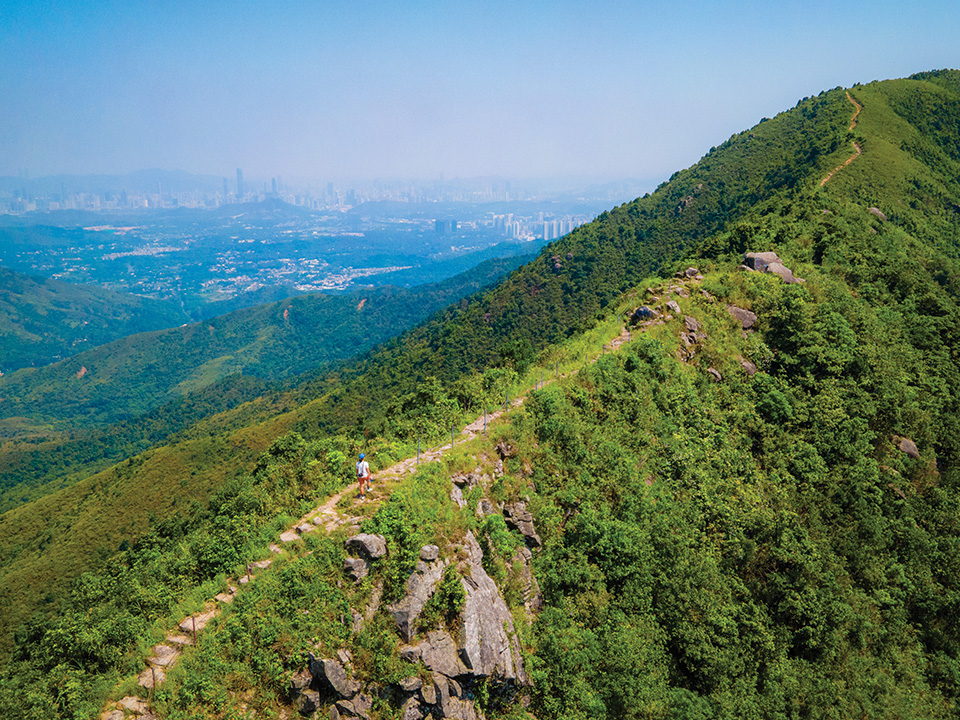
Sri Lankan conservationist Eric Wikramanayake is WWF Hong Kong’s director, Wildlife & Wetlands. But when he started working for this independent branch of the global conservation body in 2019, he knew nothing about the city’s wild side.
“My preconceived notion was that it was a concrete jungle,” he says. “I wondered how I could survive living in a dense city environment like this. But when I found that there is a lot of green space, it made it much easier for me to adapt. I love visiting places with great biodiversity. The Tai To Yan trail in Lam Tsuen Country Park, northern New Territories, for instance, is home to lots of birds, butterflies and snakes.”
Eric grew up in Colombo, Sri Lanka’s capital. “As I got older, I began to see how forests were being cleared and coral reefs were being destroyed,” he says. Inspired by family day trips into the countryside when he was young, he decided to pursue a career in conservation, which led him to study in the United States for his doctorate in ecology and conservation biology.

Tai To Yan: a wildlife paradise
Today, Eric’s job involves leading conservation projects in the city, developing strategic plans about areas to protect. His work often takes him on hikes across the city’s expansive countryside, including the Tai To Yan trail (‘big knife cliff’ trail), which stretches for about 10 km through the rolling hills and breathtaking peaks of Lam Tsuen Country Park.
The Tai To Yan trail epitomises Hong Kong’s abundant biodiversity. Here, you will find a range of wildlife, including butterflies such as the fast-flying great orange tip and the red Helen, identifiable by its forked, white-patched hindwings. The Chinese bulbul, known for its bright birdsong and white patches around its black head, also calls this area home. If you are very lucky, you may even spot the protected black-spotted leopard cat.

“It’s such a unique trail,” he says. “We climbed to a wooded area with trees that are large for Hong Kong. The presence of larger trees means older forests, which have a richer biodiversity, especially of species that can survive in old-growth forests.
“The undergrowth features nice ground orchids and other shrubs. Once you get above the forest, you come to grasslands and plants such as rhododendrons, which burst with beautiful red or purple flowers in spring. You’ll also see butterflies and birds everywhere.”
The Tai To Yan trail overlooks some of Hong Kong’s most richly diverse ecological sites, which Eric is helping to protect. Walk along the long ridgeline to enjoy views of the marshes of Mai Po Nature Reserve on one side and Plover Cove on the other. “A few other trails also follow ridgelines, but usually not for such a long distance,” he says. “It’s spectacular.”

Finding balance in nature
Eric’s regular weekend hikes see him meeting hikers who are keen to enjoy the health benefits of Hong Kong’s great outdoors.
“People are beginning to venture outside to de-stress and appreciate the many wonders of nature,” he says. The more people enjoy the city’s unspoilt country parks, the more they will want to see them protected.
“Hong Kong has done a fairly good job of conserving some important habitats for the local flora and fauna, and also rehabilitating and restoring some of the forests that were cut down many years ago,” he says. “Hong Kong’s growing ecosystems are linked to regional systems and drivers, including the thousands of migratory birds that head to Mai Po each year.”
Mai Po highlights the global importance of conservation efforts in Hong Kong. “Those migratory birds that make Mai Po so important and attractive are also dependent on other wetlands outside Hong Kong,” Eric says.
Hong Kong is full of surprises — boasting beautiful country trails and parks with abundant wildlife and spectacular views at every turn. “It’s up to us to protect and preserve these natural treasures, for our enjoyment now and in the future,” he says.

Eric Wikramanayake picks top 5 Hong Kong ecological highlights
The marshland at Mai Po Nature Reserve is a wetland site of international importance. In winter and spring, it is visited by tens of thousands of migratory water birds.
Hong Kong’s ocean waters are home to two marine mammals, the rare pink Chinese white dolphin and the Indo-Pacific finless porpoise.
In Central district, you may be surprised to see a flock of yellow-crested cockatoos — critically endangered natives of eastern Indonesia — which are descended from cockatoos believed to have escaped captivity during the Second World War.
In Hong Kong, you can spot two species of horseshoe crabs: the endangered Chinese horseshoe crab inhabits mudflats and sandy beaches; the mangrove horseshoe crab, as its name suggests, lives around mangrove swamps.
The city has two carnivorous plants, which trap and feed on insects. Pitcher plants, native to Hong Kong, entice insects and small animals into their liquid-filled, pitcher-shaped tendrils and digest them with enzymes. Spoon-leaved sundews trap insects with sticky droplets on their leaves’ sensitive red hairs, which close tight around their prey.
Information in this article is subject to change without advance notice. Please contact the relevant product or service providers for enquiries.
The Hong Kong Tourism Board disclaims any liability as to the quality or fitness for purpose of third party products and services; and makes no representation or warranty as to the accuracy, adequacy or reliability of any information contained herein.





